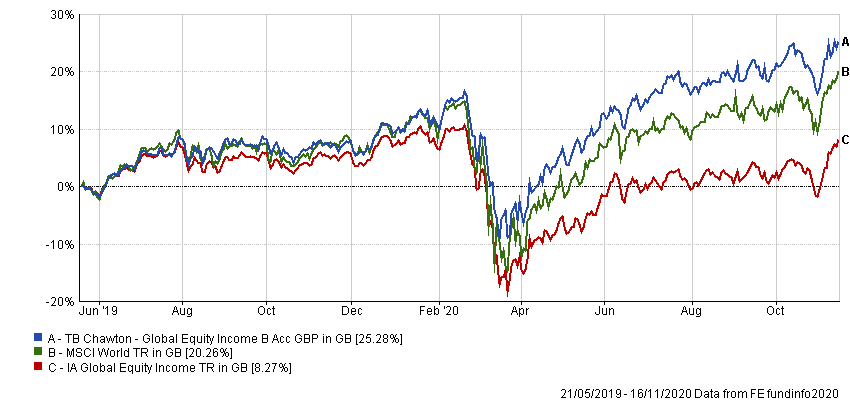Fund managers are focusing too heavily on gathering assets at the expense of performance, according to Michael Crawford, manager of the TB Chawton Global Equity Income fund.
Crawford started his fund management career at Deutsche Asset Management before moving to Bessemer Trust, where he ran the global equity segment of the $6bn Old Westbury Large Cap Strategies fund.
Yet while he credits these experiences with helping him to shape his investment philosophy, he had long harboured an ambition to set up his own business after being frustrated by what he referred to as the inherent conflicts in major fund management groups. He said among the most damaging of these is the fixation on asset gathering.
“The focus of Chawton is very much on investment,” he explained. “I have most of my money in this fund and ultimately I think I’m going to get most of my return from investment as opposed to profitability on the fees.
“Most other fund managers do not think like that. Their key performance indicators are growth in assets under management.”
Crawford said this focus on asset gathering is most obvious from looking at the “hundreds of funds” available from groups such as Schroders and BlackRock. However, he said it is also noticeable among his smaller competitors, which will rush to launch other products if their first fund is successful.
It could be argued that economies of scale should allow fund groups to cut fees as their business grows. Crawford said that often the opposite is true.
“A key aspect of our business at this stage is our aim to keep costs very low,” he continued.
“For example, we don’t have a large team of analysts, we don’t have expensables and so forth. Obviously, that is going to limit our resource in terms of growing the business to a huge amount and servicing a lot of customers. But it is not going to impact on the investment side, it is going to impact on the marketing side.”
Higher costs are not the only way in which the focus on asset gathering can harm returns. The job of a salesman with annual targets and incentives is made much easier if the fund they are tasked with selling delivers consistent performance year in, year out. Crawford said this results in a pressure to chase short-term outperformance.
“What I found when I have been working at companies with wider teams,” he added, “is that there is an element of the team – and often it's the chief investment officer or another senior member – who will try to increase the tactical overlay, where they will say: ‘OK, we are long-term investors, but we just think the US is looking expensive, Asia is looking more attractive.’
“And they will then put pressure on fund managers to reflect that view.”
A focus on asset gathering can also result in liquidity constraints, preventing funds from investing in high-growth small caps if they reach a certain size. One way to stop this happening is to soft-close a fund once it breaches a set limit.
Yet while liquidity is something Crawford is conscious of, he said he is unlikely to ever turn investors away from his fund.
“I do think it is important that if an investor wants to get out of the fund because they want to buy a house or something, they would be able to,” he said.
“At Bessemer, I was running quite sizable funds and globally I was aware that when you’re outside the US, liquidity can drop off quite rapidly.
“The way we work, we have a rule that we should be able to sell most of the fund within one week at 25 per cent of the volume for each individual holding and I think that’s going to be the biggest constraint on size.
“The other aspect of our approach is it is a little more focused on the larger end: it’s a multi-cap fund, but we do have a better representation in slightly larger companies. I do think we are capable of growing to a larger size.
“For those two reasons, I don’t think there will be a soft-close.”
Data from FE Analytics shows TB Chawton Global Equity Income has made 25.28 per cent since launch in May 2019, compared with 20.26 per cent from the MSCI World index and 8.27 per cent from the IA Global Equity Income sector.
Performance of fund vs sector and index since launch

Source: FE Analytics
It is the third best-performer of the 54 funds in its sector over this time, but its ongoing charges figure is 1.29 per cent, the fifth highest. The fund is yielding 1.6 per cent.






